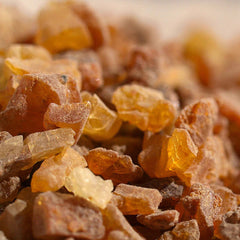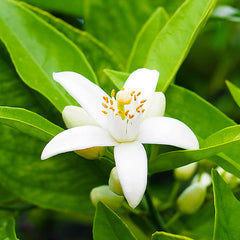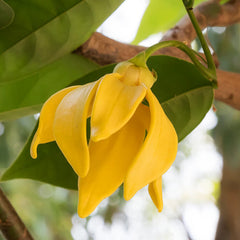What Does Patchouli Smell Like?
As An Amazon Associate We Earn From Qualifying Purchases At No Extra Cost To You

Embark on a sensory journey to explore the earthy and captivating aroma of patchouli. Originating from the mint family, patchouli is a fragrant herb renowned for its rich, complex scent that has become a staple in the world of perfumery. Join us as we delve into the question: What does patchouli smell like?
What Does Patchouli Smell Like?
The fragrance of patchouli is a tapestry of earthy, woody, and sweet notes that together create a distinctive and enduring olfactory experience. Imagine the scent of damp soil after a summer rain, blended with hints of woodiness and a touch of sweetness. Patchouli's aroma is a celebration of nature, offering a warm and grounding olfactory journey.
Approaching patchouli, the first impression is an earthy essence that evokes the experience of walking through a dense forest. The fragrance carries a deep, grounding quality reminiscent of the damp soil and fallen leaves underfoot. Patchouli's earthy notes transport you to the heart of nature, creating a connection with the raw beauty of the outdoors.
As you delve deeper into the scent, you'll encounter a warm and woody richness that characterizes patchouli. Picture the comforting aroma of aged, seasoned wood, enveloping you in a cocoon of natural warmth. Patchouli's woody facets contribute to the overall complexity of the fragrance, offering a sense of familiarity and tranquility.
Amidst the earthiness and woodiness, there is a subtle sweetness in patchouli's scent, adding a layer of mystery and intrigue. The sweetness is not sugary but rather a natural, warm sweetness that balances the robust earthy and woody elements. This touch of sweetness contributes to the overall complexity, making patchouli a versatile and enchanting fragrance.
Patchouli's scent carries a mystical depth that seems to transcend time. Its enduring and persistent nature makes it a base note in many perfumes, anchoring the fragrance and allowing it to evolve over time. The journey through patchouli's scent is like navigating the layers of history, where each whiff unveils a new facet of its captivating aroma.
In essence, patchouli's fragrance is a symphony of earthy essence, woody warmth, sweet mystery, and mystical depth. It stands as a testament to the versatility of this aromatic herb, offering a sensory experience that is both grounding and enchanting. Patchouli, with its complex and enduring aroma, invites us to connect with the natural world and embrace the richness of its olfactory tapestry.
Factors Influencing the Scent of Patchouli Fragrance Oil
Patchouli fragrance oil is a carefully crafted composition designed to capture the unique and complex aroma of the Pogostemon cablin plant, commonly known as patchouli. The formulation of this fragrance involves a thoughtful combination of aromatic compounds. Here are several factors that contribute to the earthy and woody scent of patchouli fragrance oil:
-
Fragrance Composition: Patchouli fragrance oil is a meticulously blended mixture of various aromatic compounds, chosen to replicate the characteristic scent of patchouli. This composition may include both synthetic and natural ingredients to achieve the desired olfactory profile.
-
Patchouli Essence: At the heart of the fragrance lies the essence of patchouli. Notes of earthiness, woodiness, and sweetness are intricately blended to mirror the warm and complex aroma of patchouli.
-
Synthetic vs. Natural Components: Patchouli fragrance oil often combines both synthetic and natural ingredients. Perfumers make choices to strike a balance between authenticity, cost considerations, and sustainability in the selection of these components.
-
Extraction Method: The method used to create patchouli fragrance oil, whether through distillation or extraction, plays a crucial role in defining the aromatic profile. Specific extraction methods contribute to the faithful recreation of the rich and earthy scent.
-
Additional Woody and Sweet Notes in the Blend: The fragrance may incorporate additional woody elements or subtle sweet notes to enhance complexity. These complementary notes contribute to the overall warmth and richness of the scent, capturing the essence of patchouli.
-
Quality of Ingredients: The quality of raw materials, including the source of essential components, directly influences the depth and authenticity of the patchouli scent in the fragrance oil.
-
Perfumer's Artistry: The expertise and creativity of the perfumer or fragrance creator are crucial. Perfumers leverage their skills to balance different components, creating a distinctive and delightful patchouli fragrance.
-
Regulatory Compliance: Adherence to regulatory standards and restrictions on certain fragrance ingredients is crucial. Compliance with safety guidelines requires careful consideration of ingredient choices to ensure the fragrance is safe for use.
-
Usage in Products: Patchouli fragrance oil can be incorporated into various products, including perfumes, candles, room sprays, and bath products. The interaction with other ingredients in specific product formulations can influence how the patchouli scent is perceived.
-
Product Type and Concentration: The concentration of patchouli fragrance oil in a product affects the strength and longevity of the scent. Higher concentrations may be suitable for perfumes, while lower concentrations work well for candles, soaps, or room sprays.
-
Storage Conditions: Proper storage conditions for patchouli fragrance oil, both before and after formulation, are essential to maintain its stability and scent. Storing it in a cool, dark environment helps preserve the richness of the fragrance.
-
Consumer Preferences and Trends: Formulations of patchouli fragrance may adapt to changing consumer preferences and market trends. The popularity of earthy scents or unique blends may influence product formulations.
-
Artisanal vs. Commercial Production: Differences between artisanal and commercial production of patchouli fragrance oil may impact ingredient sourcing, formulation, and overall quality. Artisanal methods may emphasize craftsmanship and unique blends.
-
Post-Formulation Processing: Additional processes, such as aging or filtering after the formulation of the fragrance oil, may influence the final scent and contribute to the desired characteristics.
Exploring different formulations of patchouli fragrance oil allows consumers to experience a range of earthy and woody scents reminiscent of the captivating patchouli herb. Individual preferences play a significant role in selecting the perfect patchouli fragrance for various applications.
What to Look for When Choosing Patchouli Fragrance Oil
Selecting a patchouli fragrance oil allows you to enjoy the earthy and woody aroma of patchouli, a versatile and timeless scent. Whether used in perfumes, candles, or personal care products, consider these factors to ensure you choose a high-quality and authentic patchouli fragrance oil:
-
Authentic Earthiness: Seek a patchouli fragrance oil that authentically captures the rich and earthy scent of real patchouli. Look for a fragrance that embodies the unique notes characteristic of quality patchouli.
-
Natural vs. Synthetic: Determine whether the fragrance oil is derived from natural sources or is synthetically produced. Natural patchouli oils can provide a more nuanced and realistic scent, closely resembling the aroma of actual patchouli.
-
Blend Ingredients: Check the blend of ingredients in the fragrance oil. A well-crafted combination of natural and synthetic components can contribute to a balanced and long-lasting patchouli fragrance.
-
Intensity Level: Consider the intensity level of the patchouli fragrance. Some may prefer a subtle and grounding scent, while others may desire a more pronounced and enduring aroma. Look for a fragrance that aligns with your desired level of intensity.
-
Versatility: Choose a fragrance oil that is versatile and suitable for various applications. Whether used in perfumes, candles, lotions, or diffusers, versatility allows you to enjoy the earthy scent in different settings.
-
Packaging: Assess the packaging of the fragrance oil. Opt for a bottle that is dark or opaque to protect the oil from light exposure, preserving its richness and preventing deterioration over time.
-
No Residue or Discoloration: Ensure that the patchouli fragrance oil leaves no residue or discoloration when incorporated into different products. A high-quality oil should seamlessly integrate into various mediums without causing unwanted effects.
-
Manufacturer Reputation: Research the reputation of the manufacturer or brand. Choose well-established brands with positive reviews, as they are more likely to produce reliable and high-quality fragrance oils.
-
Testing Options: Look for fragrance oils that offer testing options or sample sizes. This allows you to experience the scent firsthand before committing to a larger quantity, ensuring it aligns with your preferences.
-
Ethical and Sustainable Practices: Consider the manufacturer's commitment to ethical and sustainable practices. Brands that prioritize responsible sourcing and environmentally friendly production contribute to a more conscientious choice.
By considering these factors, you'll be better equipped to choose a patchouli fragrance oil that not only aligns with your preferences but also ensures a high-quality and grounding olfactory experience in your chosen applications.
Where to Find Reputable Patchouli Fragrance Oils
Discovering high-quality patchouli fragrance oils requires exploring trusted sources that prioritize authenticity and craftsmanship. Here are some places to find reputable patchouli fragrance oils:
-
Specialty Candle and Soap Supply Stores: Explore specialty stores dedicated to candle-making and soap supplies, as they often carry a variety of fragrance oils, including unique scents like patchouli. These stores may offer options suitable for crafting candles, soaps, and other scented products.
-
Online Fragrance Oil Retailers: Browse reputable online platforms specializing in fragrance oils. Websites and retailers dedicated to aromatherapy, candle making, or DIY crafting may have an extensive selection of patchouli fragrance oils. Check product descriptions and customer reviews for authenticity and quality.
-
Artisanal or Handmade Markets: Attend artisanal markets or craft fairs where independent sellers showcase handmade products. Artisan vendors may create unique and carefully crafted patchouli fragrance oils, providing an opportunity to explore distinct options.
-
Local Essential Oil or Perfume Shops: Specialty shops focusing on essential oils or perfumes may carry patchouli fragrance oils. These stores often prioritize high-quality scents and may offer a range of unique and earthy aromas.
-
Online Marketplaces: Platforms like Etsy or other online marketplaces featuring handmade or artisanal products can be sources for patchouli fragrance oils. Look for sellers with positive reviews and detailed information about their products.
-
Aromatherapy Stores: Aromatherapy stores often carry a variety of fragrance oils for different applications. Inquire about the availability of patchouli scents to add an earthy and grounding aroma to your living space.
-
Local Farmers' Markets or Herbal Shops: Check with local farmers' markets or herbal shops that specialize in natural products. Some of these establishments may offer fragrance oils with botanical scents, including patchouli.
-
Specialty Perfume Retailers: Explore specialty perfume shops that focus on unique and exotic fragrances. These stores may carry patchouli fragrance oils known for their distinctive and earthy notes.
-
Word of Mouth: Seek recommendations from friends, family, or members of fragrance communities for trusted sources of patchouli fragrance oils. Personal experiences and suggestions can guide you to reputable suppliers known for quality and authenticity.
-
Check Ingredients and Descriptions: Before making a purchase, carefully read product descriptions and check ingredient lists for patchouli fragrance oils. Authentic and reputable sellers provide clear information about the composition and intended use of their products.
Note: Patchouli fragrance oils can bring an earthy and grounding note to your DIY projects. Ensure that the fragrance oil you choose aligns with your intended use, whether it's for perfumes, candles, diffusers, or other creative endeavors. Follow safety guidelines provided by the manufacturer for proper usage.
20 Questions and Answers about Patchouli:
-
What is patchouli?
- Patchouli is a fragrant herb belonging to the mint family, Lamiaceae. The essential oil extracted from its leaves is widely used in perfumery.
-
Where does patchouli originate from?
- Patchouli is native to Southeast Asia, particularly in Indonesia. It is also cultivated in countries like India, China, Malaysia, and the Philippines.
-
How is patchouli essential oil extracted?
- Patchouli essential oil is extracted through steam distillation of the dried leaves of the patchouli plant.
-
What does patchouli smell like?
- Patchouli has a rich, earthy, and woody aroma. It is often described as musky, with sweet and spicy undertones.
-
What makes patchouli a popular ingredient in perfumery?
- Patchouli is valued for its long-lasting, complex scent. It acts as a fixative, helping to anchor and enhance other fragrance notes in a perfume.
-
Is patchouli used in both men's and women's fragrances?
- Yes, patchouli is a versatile ingredient used in both men's and women's perfumes. Its distinct fragrance complements a variety of scent profiles.
-
What other fragrance notes pair well with patchouli?
- Patchouli blends well with a range of notes, including citrus (like bergamot or orange), floral (such as rose or lavender), and spicy (like cinnamon or clove).
-
Can patchouli be overpowering in a perfume?
- Patchouli can be potent, so perfumers often use it in moderation to avoid overpowering the fragrance. Its strength makes it suitable for creating bold and distinctive scents.
-
Is patchouli associated with any specific time period or cultural movement?
- Patchouli became popular in the 1960s and 1970s, associated with the counterculture movement. It was often used as a symbol of rebellion and free-spiritedness.
-
How does patchouli interact with the skin?
- Patchouli oil is known for its skincare benefits. It is believed to have anti-inflammatory and antifungal properties, making it a popular ingredient in some cosmetic products.
-
Can patchouli essential oil be used on its own as a fragrance?
- Yes, patchouli oil can be used as a standalone fragrance. Some people appreciate its unique scent and use it as a natural perfume.
-
Does patchouli have any aromatherapy benefits?
- Patchouli is often used in aromatherapy for its grounding and calming properties. It is believed to help alleviate stress and anxiety.
-
Can patchouli essential oil change over time?
- Yes, like many essential oils, patchouli can undergo changes in fragrance and color over time due to exposure to light and air.
-
Is patchouli oil affected by climate and geography?
- The quality of patchouli oil can be influenced by the climate and geography of the region where the plant is cultivated. Different growing conditions can produce variations in the oil.
-
Are there different varieties of patchouli?
- Yes, there are several varieties of patchouli, and the specific type can influence the aroma and chemical composition of the essential oil.
-
Can patchouli be used in combination with synthetic fragrance ingredients?
- Yes, patchouli is often blended with synthetic fragrance ingredients to create unique and modern scents in perfumery.
-
Is patchouli oil sustainable?
- Sustainable farming practices and ethical sourcing of patchouli are increasingly important in the perfume industry to ensure the long-term availability of this ingredient.
-
Does patchouli oil have any potential side effects?
- Patchouli oil is generally safe for external use, but it's advisable to do a patch test to check for any skin sensitivities. Pregnant women should consult with a healthcare professional before using patchouli oil.
-
How should patchouli-based perfumes be stored?
- Like many essential oils, patchouli oil is sensitive to light and air. Store patchouli-based perfumes in a cool, dark place to preserve their fragrance.
-
Can patchouli be used in home fragrance products?
- Yes, patchouli is a common ingredient in scented candles, diffusers, and air fresheners, bringing its distinctive aroma to various home fragrance products.
Buy Perfumes - Best Online Retailers
Click For Affordable Inspired Perfume Alternatives
Click For The Best Niche Perfumes & Decants
Pheromone Perfumes - Confidence, Attraction & Appeal - Click For More
Home Fragrances & Candle Warmers - Click To Scent Up Your Spaces Today!



